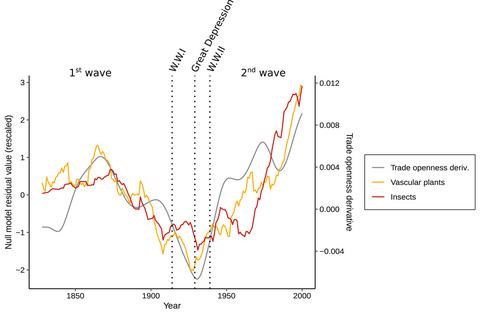当前位置:
X-MOL 学术
›
Ecol. Lett.
›
论文详情
Our official English website, www.x-mol.net, welcomes your
feedback! (Note: you will need to create a separate account there.)
Insect and plant invasions follow two waves of globalisation
Ecology Letters ( IF 7.6 ) Pub Date : 2021-08-22 , DOI: 10.1111/ele.13863 Aymeric Bonnamour 1 , Jérôme M W Gippet 1 , Cleo Bertelsmeier 1
Ecology Letters ( IF 7.6 ) Pub Date : 2021-08-22 , DOI: 10.1111/ele.13863 Aymeric Bonnamour 1 , Jérôme M W Gippet 1 , Cleo Bertelsmeier 1
Affiliation

|
Globalisation has facilitated the spread of alien species, and some of them have significant impacts on biodiversity and human societies. It is commonly thought that biological invasions have accelerated continuously over the last centuries, following increasing global trade. However, the world experienced two distinct waves of globalisation (~1820–1914, 1960-present), and it remains unclear whether these two waves have influenced invasion dynamics of many species. To test this, we built a statistical model that accounted for temporal variations in sampling effort. We found that insect and plant invasion rates did not continuously increase over the past centuries but greatly fluctuated following the two globalisation waves. Our findings challenge the idea of a continuous acceleration of alien species introductions and highlight the association between temporal variations in trade openness and biological invasion dynamics. More generally, this emphasises the urgency of better understanding the subtleties of socio-economic drivers to improve predictions of future invasions.
中文翻译:

昆虫和植物入侵伴随着两波全球化浪潮
全球化促进了外来物种的传播,其中一些对生物多样性和人类社会产生了重大影响。人们普遍认为,随着全球贸易的增加,生物入侵在过去几个世纪中不断加速。然而,世界经历了两次不同的全球化浪潮(~1820-1914 年,1960 年至今),目前尚不清楚这两次浪潮是否影响了许多物种的入侵动态。为了测试这一点,我们建立了一个统计模型,该模型解释了采样工作的时间变化。我们发现昆虫和植物的入侵率在过去几个世纪中并没有持续增加,而是随着两次全球化浪潮而大幅波动。我们的研究结果挑战了外来物种引入持续加速的想法,并强调了贸易开放的时间变化与生物入侵动态之间的关联。更一般地说,这强调了更好地理解社会经济驱动因素的微妙之处以改进对未来入侵的预测的紧迫性。
更新日期:2021-10-08
中文翻译:

昆虫和植物入侵伴随着两波全球化浪潮
全球化促进了外来物种的传播,其中一些对生物多样性和人类社会产生了重大影响。人们普遍认为,随着全球贸易的增加,生物入侵在过去几个世纪中不断加速。然而,世界经历了两次不同的全球化浪潮(~1820-1914 年,1960 年至今),目前尚不清楚这两次浪潮是否影响了许多物种的入侵动态。为了测试这一点,我们建立了一个统计模型,该模型解释了采样工作的时间变化。我们发现昆虫和植物的入侵率在过去几个世纪中并没有持续增加,而是随着两次全球化浪潮而大幅波动。我们的研究结果挑战了外来物种引入持续加速的想法,并强调了贸易开放的时间变化与生物入侵动态之间的关联。更一般地说,这强调了更好地理解社会经济驱动因素的微妙之处以改进对未来入侵的预测的紧迫性。










































 京公网安备 11010802027423号
京公网安备 11010802027423号